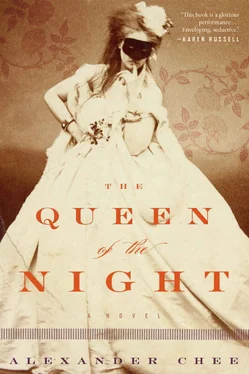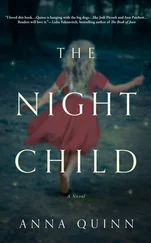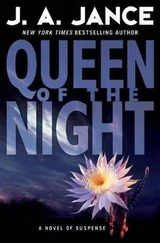She did not seem to my mind a conventional Milanese, but rather something more southern his line had dipped itself in.
They smiled when I thanked him, and I thought of how rare real affection was in noble families.
He stroked the bottom of his wine goblet. You’re very welcome, he said. The rooms are so numerous there are inhabitants entirely unknown to me.
An odd stillness stole in when he said this, as if his family and servants watched their own secrets move in the air for that moment. The inhabitants were known to him is what this said; this his way of telling us all this was so.
All palaces of this size usually hid at least a mistress or more, perhaps even the children of the mistresses, some his, some not, all of these in apartments alongside the others’. Perhaps even one of the young footmen who’d helped me with my trunks was his bastard from some woman half remembered, who now patched his wife’s linens.
I’ve met one, I announced. And then told the story of the dove, which made them laugh.
I returned to my apartment after the dinner by carriage, driven across to the other side of the estate. That night, as I waited, unable to sleep, I went farther in my explorations. I walked with an oil lamp through more grand rooms covered in the frescoes of nymphs, satyrs, gods, and goddesses typical to the apartments of royals of the age. The furnishings covered in muslin made the rooms seem like the ghosts of still other rooms, and here and there in the dark flashed a bit of gilt and crystal. The mirrors were shrouded.
The echoes of my footsteps in the marbled halls were all that kept me company. Only when I paused could I hear the silence return, filling in my footsteps behind me.
I found a music room, with paintings of Apollo and his lyre, of Pan and his flute. It was a contest between them for Pan’s flute, made from the canes of a reed that was once a nymph whom Pan had pursued. She’d changed into a reed in order to escape, and he found her, cutting and then binding her to make what was left of her into this instrument that plays at his will.
I stood for a while, waiting, sure my hopes were lost, looking out of the nearest window.
I also had changed into a reed in order to escape a god. Was there a way to change back?
What then? I asked myself.
In the dark, the vast shapes of the palace seemed like the pieces of ancient nights remade into this place at the prince’s will. Sure my vigil had finally come to some lonely end, I left for Sant’Agata after the run in Milan concluded.
There, the Verdis greeted me with great affection. They told me they’d heard the tenor had been killed in a duel and expressed their condolences. I expressed shock and grief, kissed them, and sat down to listen to Giuseppina tell me what she knew.
§
After a very long, very fine dinner, I bid the two of them good night and went back to my rooms.
I felt it before I entered, the warmth ahead of me in the dark as I walked the halls to my rooms with a lamp. I heard the fire in my apartment and moved toward it quickly, expecting Doro to appear and help me dress for bed. Doro had refused me when I gave her notice, insisting I was not well, and saying, Would you really refuse me a trip to Italy?
Instead, there in an armchair was Aristafeo, exhausted and afraid, and in his lap an envelope I had long expected, very like the one he’d sent before.
I knew it had to have been a magnificent bribe for Doro to do this; the ferocity of her loyalty had never once allowed such a thing. I’d had no shortage of admirers attempting to sneak into my rooms. I admired them both in this instant.
I shut and bolted the door before I walked behind the chair and embraced him, bending down. His head tilted back against my brow then.
I did not think I would get here, he said. He looked at his hands.
He turned the envelope over to me. I peeled open the flap, tossed the wax into the fire where it sizzled against the wood, and sat myself in the chair opposite him.
What did you tell Verdi? I asked. Or does he approve?
It was your maid I bribed, he said. The master never saw me. He does not yet know I am in his house.
He then reached and poured himself a cognac from the table beside him. He reached and handed me a cognac of my own.
It has been reported the tenor was killed in a duel, I said, of Giuseppina’s news. Was it you? I asked.
At first I thought it was, he said. We had set the date for the morning after his last performance in Carmen so it would not disturb the run. But he never came. Even his valet was surprised. It was very sad, in its way. We waited on the lawns of the Baroness’s estate in Rouen until evening, and I was declared the victor. I had the news published to shame him, he said, when he failed to show.
To first blood? I asked.
To the death, he said.
And on what terms? I asked.
Pistols. For your honor, he said. But my own as well. In truth, for many things.
When were you going to tell me?
Tonight, he said. If I had lived.
What delayed you, then? I asked.
The fire cracked and sputtered, and I could not look at it.
I was under suspicion for his murder, he said. Until they found his body in the Seine. The Baroness and her staff testified I had been in Rouen all night preparing to meet him, and I was cleared. And as I had not actually fought the duel, I could not be charged with dueling, either.
Are we free, then? I asked.
It may be we are, he said. At last.
I drew his ring out from the pocket at my waist and put it on, slid out a cigar and lit it, offering him one as well, which he took. As he did so, I saw in his eyes that he had guessed.
He was waiting for me to tell him what I could not tell him.
I must go, he said. I will spend the night nearby and arrive in the morning as a proper guest.
I reached back and undid the diamond comb holding my cadogan in place so my hair fell down around me in a dark wave past my shoulders. I stood and opened my dress swiftly at the back until it slid down before his chair. He sat forward to rest his face against my bare stomach.
Thank you, he said. And he then rose from his chair, turned me around, and brought me into the bed.
§
We lay there together afterward.
What of your curse — what will you do when you become a circus rider? he asked.
It was only a lie, I said. There is no curse.
He laughed. Then, yes, it’s fine; it’s clearly impossible. The rest of the opera is there, he said, indicating the manuscript. For you.
I went to the new pages after he left, finding the final scene. He had reminded me of my dissatisfaction with the ending. I was pleased he’d altered the end, at first. The circus rider found her old circus as before, but now she sang as a way to remind the angel who she was — it was the aria at the end of which she would lose her voice.
While she performs, the wizard, her former captor, and the wingless angel lost in his amnesia both sit in the audience. Her voice is the one thing that reminds him of who he is, the angel gradually remembering her, this last aria concluding on a high E-flat over high C.
This was my favorite note of my register for the imperial quality to it; a note, that if sustained, could cover the sound of the orchestra, the other singers, the crowd, all of it gone and only the E-flat remaining until it was the only thing you knew. For me, it felt like the one true thing about me, that I could produce this note.
What of your curse? I thought again, this question still in his eyes as he waited for me to admit what I would not admit. And I would not; I could not. I would never tell him, could never tell him. This now was the curse. He would never forgive me.
Let me prepare for my return to the back of a horse, then, I said to him. Good night to you.
Читать дальше












